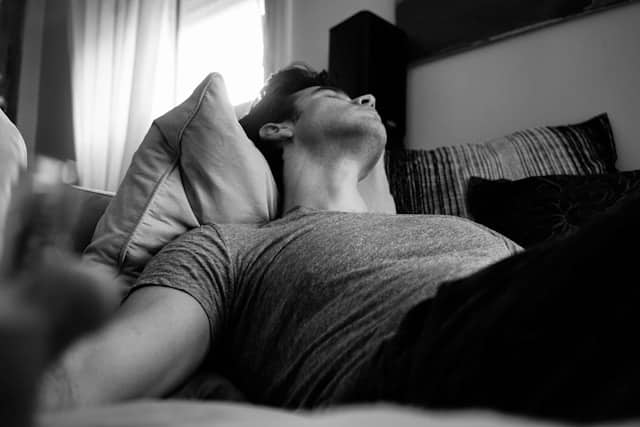How to Establish a Healthy Sleep Routine for a Yorkshire Terrier Suffering from Insomnia?

Lying awake in the dead of the night, hearing the restless stirrings of your beloved Yorkshire Terrier can be a heartbreaking experience. Your pet’s sleep patterns can be indicative of its overall health and wellness. A good night’s sleep is as vital for your dog as it is for you. So, if your dog is having trouble catching those zzz’s, it’s time to take action. This article will guide you on how to help your pet combat insomnia and establish a healthy sleep routine.
Identifying Sleep Disorders in Dogs
Before we delve into potential solutions, it’s crucial to understand the common signs of sleep disorders in dogs. If your pet exhibits changes in its regular sleep patterns, frequent waking up at night, or displays aggressive behavior due to sleep deprivation, it may be suffering from insomnia.
Also read : What’s the Most Effective Method for Potty Training a Stubborn English Bulldog Puppy?
Insomnia in dogs is often a symptom of an underlying health issue such as pain or anxiety. Certain breeds, like Yorkshire Terriers, may be more prone to developing sleep disorders due to their heightened sensitivity and predisposition to anxiety and stress.
Recognizing the Needs of Your Pet’s Breed
Yorkshire Terriers are small, energetic dogs that need both physical and mental stimulation throughout the day. Even though they are a small breed, they require a substantial amount of exercise. A common misconception is that small breeds like Yorkies don’t need as much exercise as larger breeds. This is not true. Exercise helps dogs burn off energy and promotes healthy sleep patterns.
In parallel : What’s the Best Way to Set Up an Enriched Environment for a Blind or Visually Impaired Cat?
However, exercise isn’t the only factor that will help your terrier sleep better at night. They also need mental stimulation. Mental stimulation can include puzzle toys, training, or even hide and seek games. This combined with regular exercise will ensure your pet is ready for bedtime.
Creating an Ideal Sleep Environment
Part of promoting good sleep for your Yorkshire Terrier involves creating a comfortable environment that will lull them into a deep and restful sleep. Consider providing a bed that is comfortable and suits their size. The bed should be in a quiet location, away from high traffic areas in your home.
Light control is another aspect to take into consideration. Dogs, just like humans, sleep better in a dark environment. Consider using light-blocking curtains or blinds in the room where your dog sleeps.
Implementing a Consistent Sleep Schedule
Dogs, like humans, are creatures of habit. They thrive on routine. Establishing a consistent sleep schedule can play a crucial role in combating your pet’s insomnia.
Just as you have a bedtime, so should your pet. Try to establish a schedule that includes a designated bedtime and wakeup time. This helps regulate your dog’s internal clock and promotes improved sleep.
Addressing Underlying Health Issues
Lastly, if your pet’s sleep problems persist, it may be time to seek professional help. Insomnia in dogs can often be a sign of underlying health issues such as pain or anxiety. A visit to the vet can provide valuable insight into any potential health issues your pet may be dealing with.
Your vet may suggest various treatments including medication, supplements, or even changes in diet. Each dog is unique; what works for one might not work for another. It’s important to try different solutions until you find the one best suited to your pet’s needs.
In conclusion, establishing a healthy sleep routine for a Yorkshire Terrier suffering from insomnia involves recognizing symptoms, understanding breed-specific needs, creating a conducive sleep environment, implementing a consistent sleep schedule, and addressing underlying health issues. Remember, like humans, each dog is unique and patience is key in finding the right solution. Regular consultation with your vet can help in effectively managing your pet’s sleep disorders and ensuring its overall well-being.
Understanding Sleep Apnea in Dogs
Sleep apnea is one condition that might be hindering your terrier from having a good night’s sleep. This disorder is prevalent in dogs, and it is characterized by instances where breathing repeatedly stops and starts during sleep. This can lead to discomfort and fragmented sleep.
Sleep apnea in dogs is often associated with obesity, brachycephalic syndrome (a condition common in flat-faced dogs), and hypothyroidism. While Yorkshire Terriers are not typically at high risk for sleep apnea, it’s essential not to rule it out during your quest to understand your pet’s sleep disorders.
Symptoms of sleep apnea in dogs include loud snoring, frequent waking, excessive daytime sleepiness, and even behavioral problems due to sleep deprivation. If your Yorkie shows signs of this disorder, a trip to the vet should be scheduled immediately.
The treatment for sleep apnea largely depends on the cause. If it’s due to obesity, a diet and exercise plan might be recommended. In severe cases, continuous positive airway pressure (CPAP) therapy or surgery may be the best course of action.
Accommodating Senior Dogs’ Sleep Patterns
As your Yorkshire Terrier ages, you may notice changes in its sleep patterns. Senior dogs tend to sleep more during the day and less at night. This shift in sleep habits can disrupt your dog’s sleep routine and cause insomnia.
Just like humans, senior dogs may suffer from conditions that affect their sleep, such as arthritis or dementia. If your pet is having trouble getting comfortable due to joint pain or seems confused at night, it’s essential to consult with your vet to address these issues.
An orthopedic dog bed may help ease joint pain and provide the necessary comfort for a good night’s sleep. Regular mild exercise can also help in maintaining muscle tone and flexibility and reducing restlessness at night. Mental stimulation, such as interactive toys or puzzles, can help keep your pet’s mind sharp, reducing the chances of dementia.
Adapting to your senior dog’s changing needs can be a challenge, but with patience and care, you can help your pet enjoy restful sleep in its twilight years.
Conclusion
Establishing a healthy sleep routine for a Yorkshire Terrier suffering from insomnia requires a multi-faceted approach. Recognizing the symptoms of sleep disorders, understanding conditions like sleep apnea, accommodating the changing needs of senior dogs, creating an ideal sleep environment, and fostering a consistent sleep schedule are all crucial steps in this process.
If your pet’s insomnia persists despite all your efforts, it may be time to consult a professional in veterinary medicine. Always remember that each dog is unique and may require different approaches to manage sleep disorders.
Ultimately, your aim should be to ensure your Yorkshire Terrier is happy, healthy, and well-rested. By understanding the intricacies of your dog’s sleep patterns and needs, you can help it overcome insomnia and enjoy a peaceful night’s sleep. After all, a well-rested Yorkie is a happy Yorkie, and seeing your pet healthy and content is a reward in itself.
